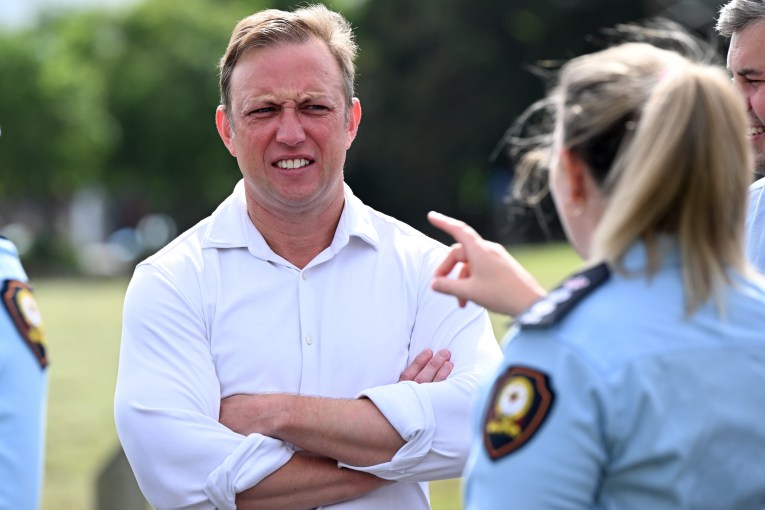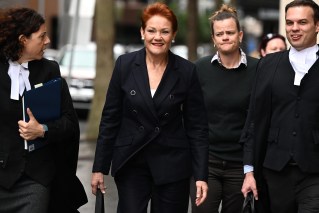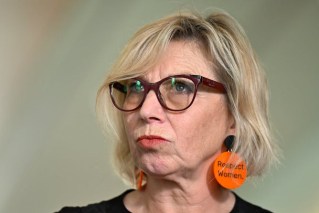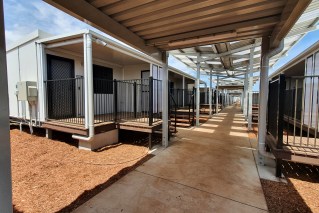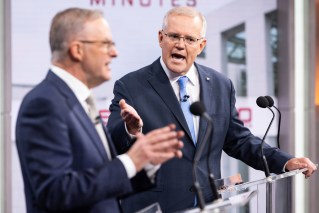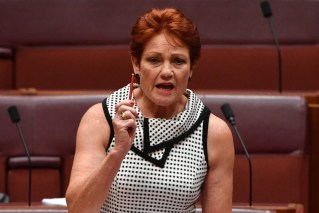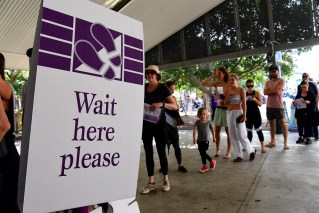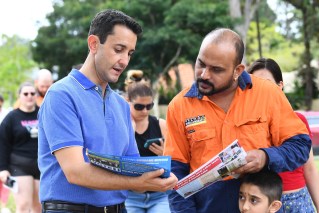It’s a girl thing: Why even big women’s vote won’t be able to dig Premier out of poll hole
Annastacia Palaszczuk might have ambled her way out of a fortnight of chaos and confusion but, as Barack Obama’s old chief of staff once said, never waste a good crisis. Dennis Atkins picks over the pieces of this latest chapter in Queensland politics


Queensland Premier Annastacia Palaszczuk is seen during a media event for the FIFA Women’s World Cup Australia and New Zealand 2023, in Brisbane, (AAP Image/Darren England)
It appears the bell ringer can take the month off. Maybe this harbinger of events in Queensland can take an extended break into the new year and perhaps through until October, 2024.
It seems John Donne’s prediction of funeral tolling, first spelt out in his ninth meditation, is not going to apply to Annastacia Palaszczuk. Donne, a great medieval poet, lighted on the metaphor of a tolling bell when he explained no man was an island, entire of itself, but rather part of a continent and all of mankind.
“Therefore never send for whom the bell tolls, it tolls for thee,” wrote Donne, offering a phrase made famous by the brilliant American writer Ernest Hemingway in a novella of the same name.
As Palaszczuk made her way through Brisbane airport late Sunday night, getting off a flight delayed by some four hours, she might have wondered if the bell might toll for her. Or she might have been so self-assured it never crossed her mind.
By the middle of Monday afternoon, it looked settled. No bell would be tolling. Palaszczuk was safe in her job as Premier, ambling on, toward her hoped-for date with destiny next May when she will exceed Peter Beattie’s nine years and 10 days in the Big Chair.
As she so often does, Palaszczuk dodged every bullet during a take-every-question news conference, handled with calm and frustrating determination. “I feel refreshed, I feel energised, and I’m absolutely determined to lead this government to the next election,” she said.
It was a message she repeated, including when asked to rule out a variety of timelines such as standing down before Christmas. Palaszczuk was helped in getting through what was always going to be a troublesome re-entry into Queensland politics by revealing she had a “medical episode” during the ALP state conference in Mackay in June which prompted a short time at the local Base Hospital where she underwent a series of tests.
The “medical episode” became the initial hot take from her first day back at work and will doubtless add to what MPs and political operatives report is a general wave of sympathy from many Queensland women who haven’t liked the media pile-on that followed the premier to her secret Italian holiday.
Male voters might not be so impressed and their antipathy will not be assuaged after Palaszczuk held up her gender as a reason for staying in politics, saying she wanted young Queensland girls and women to see a female role model taking a leadership position.
This imbalance between Palaszczuk’s support from women and men was on display in the weekend Red Bridge poll for the state which gave Labor a deficit among males twice the size of that among female voters.
That Red Bridge poll, which would push Labor to a disaster on a scale similar to the one that all but wiped out Anna Bligh’s government in 2012, was the alarm that caused Labor politicians to wonder if that bell might soon toll.
The poll was a crisis in the making. Labor is behind with every demographic and in every region but three.
The 18-24 aged group plums solidly for a Labor-Greens alliance with a 60/40 two party preferred split but this is built on a first preference vote share where the ALP comes second with 27 percent – the Greens dominate with 32 percent while the LNP lags just behind Labor with 26 percent.
It might give Labor an advantage but in many seats, especially those in inner Brisbane suburbs, sitting ALP members could be in serious trouble and lose to insurgent Greens. At the moment the Greens have two MPs in state parliament and unless something changes this will be parlayed to a tally of four, six or more.
In other slices of the electorate Labor has the thinnest of leads over the LNP among those who work part time and a relatively solid lead with people who do not own a home.
Everywhere else it’s a wasteland: with those 65 and older the LNP leads 71 percent to 29, those who own a home outright hold their hands up for the non-Labor side 64 to 36 points, and those in Central Queensland (where resource industries are predominant) are swinging behind the merged coalition 63 to 37 percent.
Put these very big, hard to turn around leads, together with the solid advantages just about everywhere else and you have to be the brightest of Labor optimists to think the Palaszczuk Government has a chance to overcome the odds and bring home fourth victory.
As unsentimental political operators say, sometimes when people have the choice between voting for Mickey Mouse or Donald Duck, they’ll support Mickey Mouse.
Palaszczuk reckons she can turn it around. She plays on something locked in her mind: everyone has written her off many times since she became leader after Bligh’s ignominious defeat 11 years ago. She scrolls through the names she’s been called and boasts she is the eternal underdog.
Maybe she can do it. However, if she is to overcome this stacked deck she needs to do more than she did on Monday.
She might have given herself some room to move but she needs more. It’s not an uncommon place for the premier. Earlier this year there were rumblings and people in the ALP and the government pushed for a reset.
That came with a cabinet reshuffle so modest few noticed it, although it worked better than some anticipated, especially with the advancement of young ministers Shannon Fentiman in health and Meaghan Scanlon who takes on housing.
At the time Palaszczuk did enough to get by. She might do so again but every time she “does enough” the political clock ticks on.
If the government did use this past fortnight of chaos and confusion as a real reset – to take stock on policy, identify possible solutions to obvious problems and chart paths to action – they might have a chance to reel in some success.
There was a glimmer of awareness in her commitment to listen more.
As Rahm Emanuel, former chief of staff to US president Barack Obama, said about the global financial crisis 15 years ago: “You never want a serious crisis to go to waste”.
